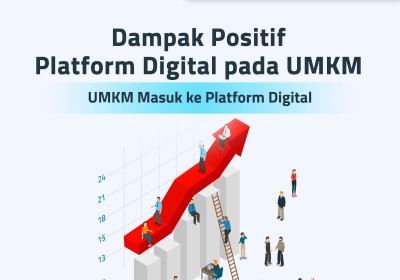Up to 24% of all Indonesian UMKMs Connected to Digital Platforms
September 02, 2021
JAKARTA – Micro, Small, and Medium Scale Businesses (UMKM) play a vital role in driving the economy.
According to data from Statistics Indonesia (BPS), 99.9% of all businesses operating in Indonesia are UMKMs. During the Covid-19 pandemic, UMKM digitalization rates, such as the utilization of online marketplaces and further online activity, rose significantly.
Throughout the pandemic, the number of UMKMs that entered digital platforms have reached 24%, compared to the previous number before the pandemic when it was only at 13%, or around 8 million businesses.
"Participation in the digital economy is important because of the potential it can bring to UMKMs, easing them into the global supply chain. In 2020, the total amount of digital transactions in Indonesia reached more than Rp 253 trillion. This figure is projected to increase to Rp 330.7 trillion by 2021," said President Joko "Jokowi" Widodo during his Presidential Address on Monday (16/8).
The Minister of UMKMs and Cooperatives (MenkopUMKM) Teten Masduki revealed that there are two types of UMKMs that have contributed the most to economic growth during the Covid-19 pandemic: agriculture-based UMKMs and digital-based UMKMs.
"Due to these UMKMs, we can see that the agriculture sector managed to grow by 12% so far this year. Digital transactions are helping our economy grow, especially for the food & beverage and homecare sectors," Minister Teten said during an online discussion on Wednesday (18/8).
Implementing Industry 4.0 technologies have proven to be vital in the growth of certain industries as well. The abundance of IT-based businesses is stimulating entrepreneurship in Indonesia, providing both a direct and indirect positive impact to the economy.
For one, Indonesia's entrepreneurship ration managed to rise to 3.47% of the total Indonesian workforce, higher than the 3.27% recorded in 2019.
Policies which support UMKM, cooperatives and entrepreneurship growth have been outlined as a priority in the government's 2020-2024 Mid Term Working Plan (RPJMN), encapsulating the growth of the number of UMKMs and self-made businesses, the growth of business capacity, network and innovation, the growth of business opportunities and the growth of social business values.
Indonesia’s Research Institutions Supporting the Development of the Electric Vehicle Industry
Indonesian Muslim Fashion and Cosmetics IKMs Shine at Dubai World Expo 2020
Govt Steps Up UMKM Transformation Efforts in the Midst of Pandemic Slowdown
Govt Encourages Promotion of IKM Products in Digital Era
Government Begins Developing Maritime Training Center in Makassar
Tweets by IDDevForum
